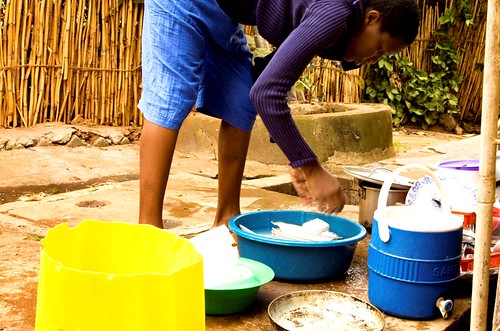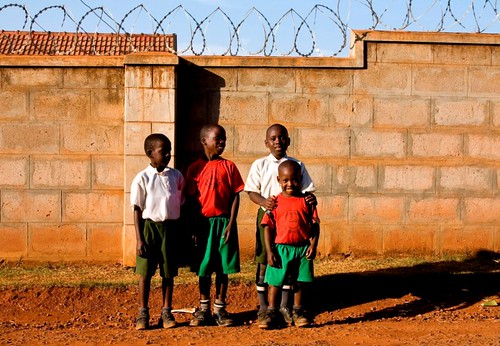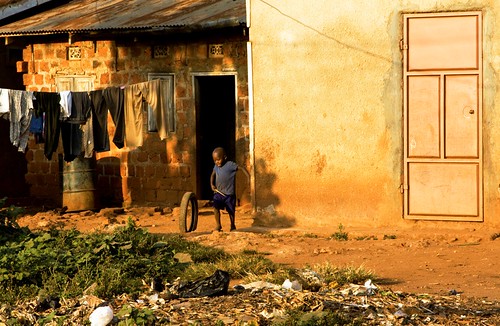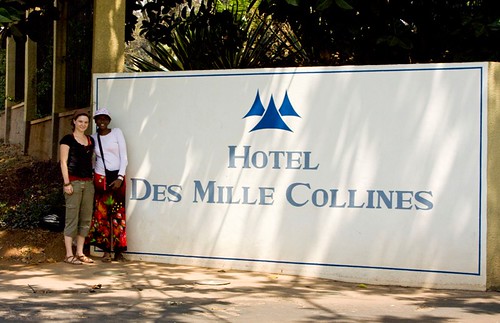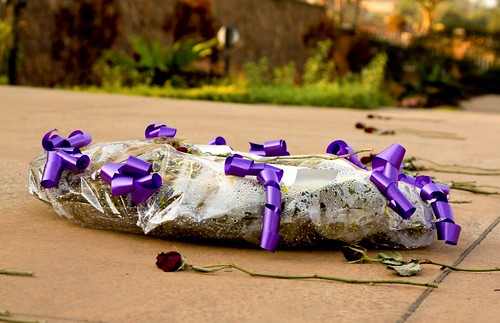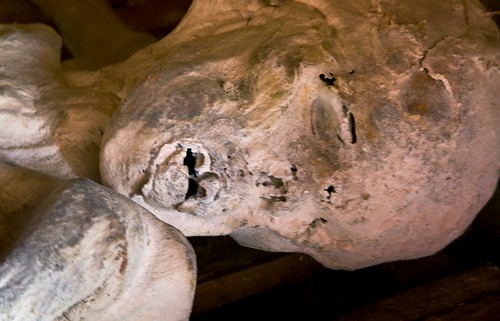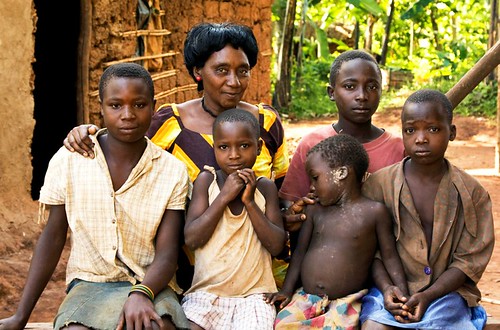Day One ~ The Little Orphan
I was hanging my clothes up to dry out back. I had spent the better part of two hours hand-washing some underwear, sports bras and a couple of tank tops in basins on the floor of our shower room; washing machines a continent and ocean away. Standing with parched hands under the wire behind our building, I faced town and the long trash strewn lawn, watching small boys kick a deflated plastic ball; I sensed the collapsed excitement from yesterday’s Presidential visit celebrated on the clearing stretched before me. A girl caught my eye. She was chewing on a bag of Ugandan doughnuts, watching me with big brown eyes, slowly walking towards me, but staying a dozen yards away. I continued with my chore; I was accustomed to idle observation.
“Hello,” I casually greeted her.
“Hi.”
“How are you?”
“I am fine.”
“What is your name?”
“Deborah.”
Conversations with strange children usually end here, but something about the girl struck my interest.
“How old are you?”
“Eight.”
“Why aren’t you in school?”
She stopped walking. I anticipated no school fees.
“No mama, no dada.”
“Oh.”
The answer was unexpected, but not surprising. Orphans litter Uganda like the waste in the grass at my feet. Most end up with other family members: aunts, uncles, cousins, jah jahs. Still, even now, I can’t say why, but I was curious about her. Her wide expressive eyes were quick and inquisitive.
“You stay with your jah jah?”
She shook her head.
“Who do you stay with?”
The conversations lulled; my words stretching beyond her English. I summond the teenage girl who emerged from the door to our right; she was our neighbor below.
“Can you translate for me?”
The neighbor tried her best, but the story sputtered like a dry tap. I asked for her mother.
The mother greeted us and asked the young girl a series of questions then relayed to me:
“It appears she was staying with her jah jah because her mother and father had passed. The jah jah died and she is alone. She has been sleeping wherever and getting food from people who take pity on her. She doesn’t remember where she first came from. She’d been with her jah jah for some time. Her jah jah’s village is past the forest. She walked all this way. Bambi.”
Some of the rough town children lie for attention, to get something from sympathizers, maybe set up a youthful heist, or just because they are compulsive liars; but I didn’t sense this from the round face filled with a beautiful smile.
“How long ago did her jah jah pass?” I asked eying the shorn hair and muscular arms, signs of care and feeding.
She asked and replied, “Just last week.” It figured. The head could very well have been last shaved a week ago, and surely several days of a poor diet wasn’t time enough for emaciation.
“Okay Deborah. You come with me.”
She happily followed me around the building where we ran into little Rachel running out of the house to see why Mama Mzungu took so long hanging clothes. I grabbed my little one up and she squealed. Into the house we went for lunch with an additional mouth to feed.
Deborah greeted the kids comfortably, repeating their names as I introduced them as if she had been to the house many times; she acted like a child from a good home, at ease, happy.
She entered the kitchen and began doing the dishes. The water was back on and I scrambled to fill the jercans before the amazzi deserted us again. I fed the little ones and as I gathered plates I noticed Deborah filling a basin with amazzi.
“What are you doing?”
She made a scrubbing motion towards the concrete floor with the rag in her hand. I nodded approvingly. She was a hard worker, a child used to doing chores; a girl that surely had been living with a jah jah too old for household labor.
Margaret returned in the late afternoon and I told her of the child I had found. She sat at the kitchen table peppering the girl with questions for many minutes. Deborah responded quietly, eyes dark, fidgeting.
“You know. I am being somehow stern with her to see if she is telling the truth. She says someone was supposed to look after her after the jah jah died, but the person disappeared.”
I nodded.
Satisfied with veracity, Margaret leaned back in the chair and promised to return with the car in an hour to seek the house of the deceased grandmother. Maybe there a neighbor could give us more information.
We left at six; the sun would be setting in about an hour. We wound off the main road after twenty minutes and onto a dirt path that lead through the villages lying near the banks of Lake Victoria.
The girl stalled when we entered her village. She said she attended the school to our left, but claimed she didn’t know the way from there.
I scoffed.
“She walked to and from that school every day. How could she not know the way?” Margaret assured me that she explained to the girl that we wouldn’t abandon her; that we were returning to the home to track her family. The sun faded; we would have to come back the next day.
Along the dirt road in the foreign village, Margaret had Sumete stop the car to fetch food from the local market. The girl continued clinging to me in the back seat.
“It’s dangerous moving with a strange child. We [should] talk to the L.C., but madam has refused,” he said in stilled English after she left.
“What? Margaret won’t talk to the local counsel?” I didn’t share Sumete’s fear of driving with the child, but notifying the local authorities of the girl seemed reasonable.
Margaret returned.
“Are we going to talk to the L.C.?” I asked her.
“Yes.”
We continued driving.
“Do you know where he stays?”
She nodded and waived ahead.
“Oh. We tell the L.C. in Lugazi, not here.”
“Yes. You know it is dangerous to move with a strange child.”
I nodded. I knew.
Child sacrifice is a serious, horrible, vile problem in Uganda. Children’s bodies are discovered in clearings, abandoned buildings, ditches, anywhere, around town or the city with missing heads and other lost body parts. The ignorant and superstitious, incredibly the educated and not alike, believe witchdoctors’ fantasies of such brutality bringing wealth.
Mob justice is also problem in Uganda. Runners exercising can be mistaken for crooks, and pummeled by mobs, oftentimes killed. Suspected thieves, murders and certainly child abductors, guilty and not, are targets of vigilante attention. Mobs rule because justice does not. Authorities apprehend suspects, but enough cash unlocks bars with or without trials, regardless of the severity of the crime. The people know that the guilty are usually extricated, so they seek their own retribution.
I watched the villagers’ homes pass in the twilight, thinking of the man killed by a mob a couple months back thought to have stolen a child and hiding her in his vehicle. I was assured by the gossiping women at the salon that his intentions were evil, but Stephen told me the following day that the victim was a fellow parishioner whom he saw many mornings at mass, he certainly didn’t do anything wrong; an innocent slaughtered, and his mass of murderers to disappearing back into the crowd never to be punished.
We arrived back in Lugazi and sought the local counsel around the corner from our house. We sat on a small couch in the small room across from the slight man. He smiled and spoke gently to the girl, then turned to us. He maintained the girl was lying. She was spoiled.
“You know I found one like this sometime back saying she was without parents from a far off village. We took her in, gave her my children’s clothes, fed her and the next day we were moving through town and her friends recognized her and started calling to her. She had parents.”
“I am not sure, but if she is lying, she is a very, very good liar, sebo.” I responded.
“We shall take her to the authorities,” he pronounced.
They returned me to our house and left for the police. After an hour I heard Margaret’s high pitched giggle coming through the door. She was very amused by the girl.
“She told the police they can’t catch her. That when they go for her, she goes that way, and out runs them and hides,” she said maneuvering and imitating the girl.
I didn’t understand why she feared the police. I was inured; accustomed to African life, but occasionally I still encountered the culturally unfamiliar. I was still thinking American where a homeless child would want to encounter police; the police would help.
“The police, you know, they come and chase the street children away. They sometimes run together and the police are after them,” Margaret explained to me. “She may have met some street children and they told her to fear the police.”
Months ago it would have taken me some time to get my head around small homeless children being chased by police, not finding a proper home, the state not doing its best to look after them; now I just nodded. It made sense.
Between bathing and eating dinner Deborah wrote in an exercise book we kept at the house for our own orphans to practice their writing and math. Deborah eyed Beatrice’s work in the front pages of the thin book of lined paper and said something that made Margaret laugh.
“She says the girl is stupid. She says she wrote chair, but drew a snake.”
I took the book from the Deborah’s hands and looked at the page filled with Beatrice’s small drawings and childish handwriting. Yes, there it was: a squiggly snake with the word chair beneath it. I smiled, understanding her amusement, but slightly irritated it was at my daughter’s expense. I handed the book back to Deborah.
“You go to school. You are bright,” I said to her.
She smiled broadly and said, “No school fees.”
“No problem.”
I was determined to see the girl’s natural intellect not go to waste. She instantly understood the words and lessons I was dictating to her, and told Stephen stories from earlier that day in great detail; recounting moments I had already forgotten. Her eyes and ears picking up everything, she was constantly searching her surroundings, her eyes darting around the house.
She knew a lot about Lugazi; more than one would surmise for a girl staying here less than a week. She insisted to Margaret and Stephen that she knew the town well because “she moved all day. You wouldn’t believe how much I moved. The days were as long as the nights.”
She was quick and funny, despite her depressing life story, which was unfolded seamlessly to me, Margaret, Ester then Stephen; details emerging and fitting together. On our way back from her village Margaret asked her to point out where she had been sleeping the past week. She drove us near the middle of town, a network of shop fronts lit up in the fresh night, townspeople walking from store to store chatting and preparing for the evening meal. We stopped across from a large dark building, unfinished, just walls of bricks with no doors and no roof.
“She says she was staying here.” Margaret told me. “She says that she would wait for everyone to leave then she would sneak in to sleep.”
Margaret asked her if she feared someone snatching and sacrificing her while she slept. Deborah said she would pray before she fell asleep.
“If I live through the night, I see another day. If I don’t, then I go to God.”
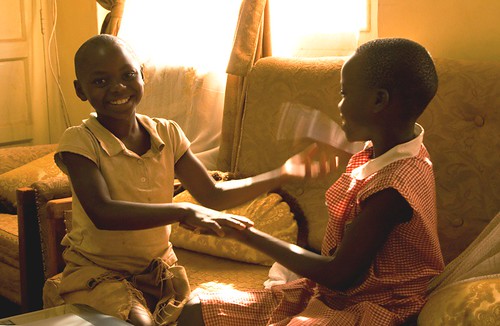
Day Two ~ The Big Pretender
The next day we stopped by the police station, Margaret and Deborah entered and after sometime they called for me. Deborah stood at the policewoman’s desk defiantly in tears.
“She is refusing to have the police come with us,” Margaret explained. The enormous woman fitted in a khaki uniform and black beret spoke deeply and emphatically to the girl in Luganda.
“How can we help you if we don’t know where you come from?” I asked Deborah. She sunk to the ground.
After some time she acquiesced and all of us ventured to the remote village: Margaret, Sumete, the policewoman, Deborah, my two little ones, Sylvia and Rachel, and myself. As we navigated the back roads the girl became unhelpful. Stating she attended a school that none of the locals on the roadsides heard of, describing wearing a uniform none had seen. No, there are no yellow and blue uniforms here.
We changed course and made way to the school we had seen the night before, one the girl claimed to have attended the previous year. Three staff members greeted us under a tree. They brought us a bench to sit across from them in the shade. They asked the girl questions in Luganda.
What class were you in here? What was the name of the headmaster? Which classroom was yours?
She didn’t correctly name the headmaster. She pointed to the far side of the plain block behind her. There were only a handful of doors leading to each of the classrooms.
“Ehh-ehh. She says she was in that class, but the P1 class is here,” the teacher said pointing to a door close to us.
They continued to talk in Luganda. She sulked and offered rude answers.
“Maybe you ask her what her P1 teacher’s name was?” I offered.
“I already did. It is not the one.”
“You know the P1 teacher?”
She raised her eyes, a Ugandan sign of confirmation. “It is me. And I don’t recall the girl.”
It was decided that we go the village’s local counsel.
Ten minutes of circling the dusty roads we arrived at a partially built home. We entered through a series of walls without a roof and emerged into a single completed room. An elderly couple greeted us. The children sat on the ground as customary and the adults in chairs. They discussed the girl in Luganda while I sat in silence waiting for an explanation. I turned to Margaret.
“What is going on?”
“Her parents’ are there.”
“What? Her parents are alive?” I said raising my voice.
“Yes. And the jah jah too. The parents are away, but she stays with her jah jah in Lugazi.”
“She doesn’t stay in the village? She stays in Lugazi?”
Margaret nodded her head. I looked at the girl. She sat near my feet playing with Rachel’s dislocated, tiny black shoe; agitation squeezed her face. The adults continued to speak in Luganda.
Maybe the jah jah had passed and these people didn’t know. I searched for truth in the girl’s testimony from that day and the one before.
“They are certain the jah jah is alive?” I asked Margaret.
“Yes. This is the jah jah’s brother,” she said pointing to the old man; we had serendipitously entered her family’s home. “And her jah jah somehow has money. She rents out property in town.”
Small pieces of information were skewing my entire mental image of the girl; I pursed my lips.
“You see her,” Margaret continued. “Her head is down. She is pretending as if she doesn’t know her own jah jah,” she said gesturing again to the old man.
“Yes! You see! She is just an unruly girl!” The policewoman blasted shaking the black tassels framing her shoulders; a statement of vindication, confirming her insistence from the beginning.
“I am furious that she lied so badly, but what makes a child choose to live on the streets rather than in a home?” I asked aloud to the room.
“We shall go to the jah jah’s to find out,” the policewoman replied.
We drove back into Lugazi, entering a community on the far side of the massive Catholic Church. The girl tried to grab my hand in the car, but I pulled away. I sought to show disapproval, but maybe the jah jah was not properly looking after her. Maybe there was a reason for her unruliness. Maybe she still needed help.
The girl picks everything. She takes clothes from lines. She steals all the time. She is a thief. She goes to the disco in town. She even wants boys. She disappears for days. She has many nice clothes at home, but she wears whatever. I pay for school fees, but she doesn’t go. Just recently I gave her five thousand for food at the market and she didn’t return. The police come here all the time. She disappears, then they return her, or they come looking for her because she has stolen.
Her jah jah and her jah jah’s mother, the girl’s great grandmother, clucked away as Deborah’s older sister sat to the side listening in sad resignation to the truth about her bad younger sibling. We sat fixedly in the small dark room of the matriarch’s home. The family was outraged by the girl, but not abusive; they seemed reasonable.
“What shall we do? She will only run away again. She has even said so,” I said to the policewoman sitting next to me. Margaret told me the jah jah in the village refused to take the girl, she already had ten grandchildren in her care and this girl would spoil all of them.
“We shall take her to the family unit at the police headquarters,” the big woman announced standing to leave.
Back into the car we went and to the other side of town, the sunlight growing golden. As we arrived, I said to Margaret, “I am sorry you had to miss work for all of this. Everything this girl has told us is a lie except for her name.”
So profoundly good, Margaret characteristically replied, “It is not a waste if we can somehow help her.”
We entered a stand-alone, round room of tin. The muscular policewoman on the bench recognized the girl immediately.
“We detained this one yesterday, but she got away pretending to urinate,” she said eying Deborah. The police headquarters were but a few hundred yards from our home, I must have met her just after her escape.
We sat down at the benches with the other police officers and Deborah’s older siblings soon appeared behind us to see their sister; they were all clean, all well dressed, all knew English; she did come from a good family and the jah jah did know how to care for children. There seemed to be no rationale for the child’s utter wickedness.
I stared at the girl as she was interrogated by the police. The jah jah barked on about the girl’s thievery and lies and bad manners and vanishing without word; painting a picture of an incomprehensibly incorrigible girl. I felt sorry for the jah jah trying to care for the seemingly uncareable. I watched the girl’s complete lack of remorse; she sat on the floor, her face drawn, eyes dancing, trying to remove herself from the surroundings. She was silent during the line of questioning. She had bragged to Margaret the day before about feigning dumbness to the police. I can even trick them.
I absorbed her, thinking about how she excelled at lying, she told detailed, thoughtful fabrications to everyone: neighbors, policemen, local counsel, family, strangers; I recalled how charismatic she was, how funny and bright, how she won people over, coddling and clinging to them, how all of us, Margaret, Ester, myself were attracted to her charm; I considered how confident she was, how she bragged about alluding the police, so self-assured she attempted to deceive countless adults undetected for days; I imagined how steadfastly sinful she was, weaving delusions and seizing items at will, constantly disobeying authority, respecting no one, wholly selfish; and I observed how guiltless she was, her total absence of regret at the sacrifices a room full of adults made on her behalf all the while she sought to swindle money and steal valuables. I felt a twinge of guilt as a word, rightfully or not, swam into my mind: sociopath.
The portrait of the little girl had not reshaped, but was altogether re-sculpted.
I looked at Margaret. She sat slumped, face drawn; as if she were an inflatable doll that had air let out; her mouth puckered.
“It seems she is impossible,” Margaret said to me.
“Yes,” I agreed softly.
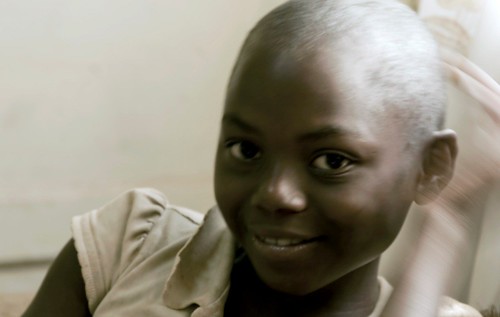
Day Three ~ The Sad Tomorrows
The following morning I awoke from a strange sleep, dreaming of the troubled child. We talked about her at the breakfast table. She was so cunning! So clever! You could tell someone about her and they would just think you were lying!
We discussed her at Ester’s shop. Eh! That girl! You can’t believe!
I saw the neighbors below us; they asked about the girl. Oh my goodness! What a child!
I told the four lounging nurses watching the doctor tend to Richard, apparently with nothing to do in hospital full of patients. Oh my! And only eight years! You can’t believe!
I told Ester’s sister, Carol. That girl is dangerous.
I came from town, after taking Richard for dressing and buying supplies for the kids, I crossed the clearing to our home. The grass slightly slopes down to the foot of the building. I recognized the partially obstructed small, but sturdy figure; the clothes were familiar. I took my sunglasses off in amazement.
“Deborah! Is that you! What are you doing here?”
The neighbors below us were near the girl laughing and shaking their heads, disbelieving her brazenness. My children heard my voice and came around the corner to greet me, throwing hugs and smiles. Beatrice had an ice pop. My little ones asked for some, Deborah reached for it aggressively. I pushed her to the side. My hostile reaction was not one the girl desired. No, really, Deborah, why are you here?
“She says her jah jah told her to stay with you,” the neighbor translated.
“Ah! It’s a lie!”
“I know,” she agreed laughing.
I received a call on my phone. It was Ester.
“What is the problem?” She could see us from her shop.
“She’s here! Deborah is here!”
“Oh no! You bring her to me.”
I grabbed the girl’s hand and walked her across the grass; she half-heartedly tried to peel her fingers away. Unsure of herself, she wanted to be with me, but didn’t anticipate my reaction; she didn’t know where to go. She was confused and trapped.
Ester sat at the threshold of the shop in a plastic chair, a customer at her feet, her fingers quickly moving, weaving together the plaiting. The women in the neighboring shops eyed the girl severely, shaking their heads, clucking away.
Alice, Ester’s boss, was the loudest. An imposing African woman with creamy coffee skin, an enormous, intimidating frame and a solid, booming voice, she railed the girl, her head and large buttock bobbing and swinging.
“She is a thief! That girl is dangerous! You take her to the police!” She cast her hand off as if throwing the girl from its end.
I lead the girl through the taxi park and along the main road, her face becoming tighter. A few men stopped out of curiosity, a mzungu clutching a dirty, shoeless, anxious child by the hand. One man told me the girl needed assistance.
“I see her loitering around here,” he said circling his hand towards the huge tree and restless townspeople, mostly men, taking shade beneath. “You know. She could be raped,” he said with genuine concern.
“I know. I am trying to help her, but the girl is very bad. She has parents. She has a jah jah that cares for her well. She’s not an orphan. It is just the girl’s mind.”
The crowd talked around us for some time offering suggestions, asking questions, thanking me for my care then we continued on our way. One man followed us trying to coach the girl as we walked. She started crying.
“She says that she stays in an uncompleted home, how do you say? Maybe just a shelter. And she is with her auntie who doesn’t care for her,” he relayed to me.
“It’s not true. She stays with her jah jah and it is a finished home. The girl is sick in the head. She is lying to you even now.”
He frowned.
“I know. I was at the jah jah’s house just yesterday!”
His face contorted into disbelief and he looked down at the child who exuded sincerity. He realized he was duped. He waived us to the police station.
The muscular police woman with the long thin braids we saw the day before made a face at Deborah.
“She just showed up at my house. She says her jah jah sent her, but I know it’s a lie,” I exclaimed to her.
The policewoman and Deborah spoke in hushed Luganda for some time. The girl staring at the railing she leaned against, sputtering her explanations.
During a long pause I said to the lady, “You know. The jah jah says the girl was fine until she went with the mother for a holiday about a year ago. Maybe something happened to her then.”
The policewoman was expressionless, not getting me.
“Maybe the girl was defiled. I don’t know how a child could suddenly act like this.”
“We will get it out of her eventually. We will be coaching her. I will give her picture to all of the police for when she runs off again,” the woman assured. She looked at the girl and sighed. “I will take her personally to her jah jah’s and make sure she doesn’t bother you again.”
I thanked her and returned home. I was surprised to see Margaret in the house. She looked at me, her eyes wild with amusement.
“I tried to not act surprised when they told me,” she said laughing.
“Can you believe it? That girl coming here again!”
“Richard said, ‘Mama Mzungu took Deborah to the police.’ I just kept quiet.”
“I told the policewoman to tell the girl that we couldn’t allow her into the home because she had lied to us. Everything but her name was a lie. If she had just told us the truth, that she had a jah jah, that she had parents, what, we would be her friends, but we can’t trust her.”
Margaret’s eyes darkened. Her face fell. I could tell that she wanted help the girl, but she knew she couldn’t. I felt the same.
“Mummy, it’s just like you said. She liked it here and wanted to stay with us, and she would have been okay for maybe a week, but she’s spoiled and confused. She would have run off with our things.”
“Not even a week,” she said sadly. “She would have disappeared after maybe a couple of days. It must have been her that stole the key to the backdoor that she blamed Rachel for losing. You know I found her looking in corners and cupboards.”
I shook my head, just incredible.
“I’ll check in with the police periodically to see how she is. I don’t think it’s appropriate for me to be interacting directly with her. I can’t believe an eight year old girl would behave this way.”
“Yes, you see it at twelve, thirteen, what, and it’s usually boys. But this one…”
I nodded looking at Margaret; I could feel myself wearing her expression. We were astonished, still reeling from the shocking child; we clung to hope for her, but were realistically saddened envisioning her future; one only slimly normal or bright; rather, very likely grim and destructive, clouded by apparent debilitating mental illness.

